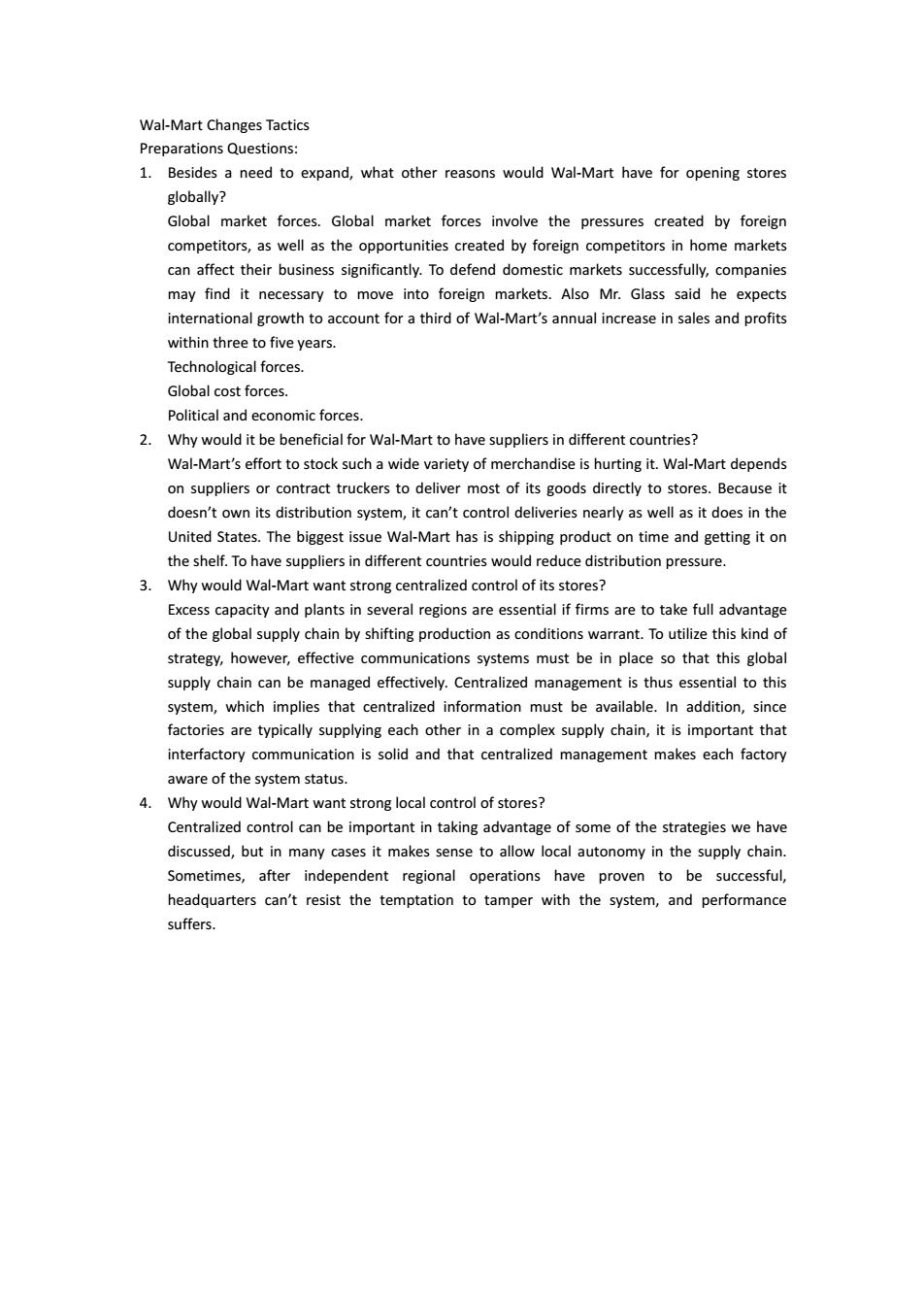
Wal-Mart Changes Tactics Preparations Questions: 1.Besides a need to expand,what other reasons would Wal-Mart have for opening stores globally? Global market forces.Global market forces involve the pressures created by foreign competitors,as well as the opportunities created by foreign competitors in home markets can affect their business significantly.To defend domestic markets successfully,companies may find it necessary to move into foreign markets.Also Mr.Glass said he expects international growth to account for a third of Wal-Mart's annual increase in sales and profits within three to five years. Technological forces. Global cost forces. Political and economic forces. 2.Why would it be beneficial for Wal-Mart to have suppliers in different countries? Wal-Mart's effort to stock such a wide variety of merchandise is hurting it.Wal-Mart depends on suppliers or contract truckers to deliver most of its goods directly to stores.Because it doesn't own its distribution system,it can't control deliveries nearly as well as it does in the United States.The biggest issue Wal-Mart has is shipping product on time and getting it on the shelf.To have suppliers in different countries would reduce distribution pressure. 3.Why would Wal-Mart want strong centralized control of its stores? Excess capacity and plants in several regions are essential if firms are to take full advantage of the global supply chain by shifting production as conditions warrant.To utilize this kind of strategy,however,effective communications systems must be in place so that this global supply chain can be managed effectively.Centralized management is thus essential to this system,which implies that centralized information must be available.In addition,since factories are typically supplying each other in a complex supply chain,it is important that interfactory communication is solid and that centralized management makes each factory aware of the system status. 4.Why would Wal-Mart want strong local control of stores? Centralized control can be important in taking advantage of some of the strategies we have discussed,but in many cases it makes sense to allow local autonomy in the supply chain. Sometimes,after independent regional operations have proven to be successful, headquarters can't resist the temptation to tamper with the system,and performance suffers
Wal-Mart Changes Tactics Preparations Questions: 1. Besides a need to expand, what other reasons would Wal-Mart have for opening stores globally? Global market forces. Global market forces involve the pressures created by foreign competitors, as well as the opportunities created by foreign competitors in home markets can affect their business significantly. To defend domestic markets successfully, companies may find it necessary to move into foreign markets. Also Mr. Glass said he expects international growth to account for a third of Wal-Mart’s annual increase in sales and profits within three to five years. Technological forces. Global cost forces. Political and economic forces. 2. Why would it be beneficial for Wal-Mart to have suppliers in different countries? Wal-Mart’s effort to stock such a wide variety of merchandise is hurting it. Wal-Mart depends on suppliers or contract truckers to deliver most of its goods directly to stores. Because it doesn’t own its distribution system, it can’t control deliveries nearly as well as it does in the United States. The biggest issue Wal-Mart has is shipping product on time and getting it on the shelf. To have suppliers in different countries would reduce distribution pressure. 3. Why would Wal-Mart want strong centralized control of its stores? Excess capacity and plants in several regions are essential if firms are to take full advantage of the global supply chain by shifting production as conditions warrant. To utilize this kind of strategy, however, effective communications systems must be in place so that this global supply chain can be managed effectively. Centralized management is thus essential to this system, which implies that centralized information must be available. In addition, since factories are typically supplying each other in a complex supply chain, it is important that interfactory communication is solid and that centralized management makes each factory aware of the system status. 4. Why would Wal-Mart want strong local control of stores? Centralized control can be important in taking advantage of some of the strategies we have discussed, but in many cases it makes sense to allow local autonomy in the supply chain. Sometimes, after independent regional operations have proven to be successful, headquarters can’t resist the temptation to tamper with the system, and performance suffers